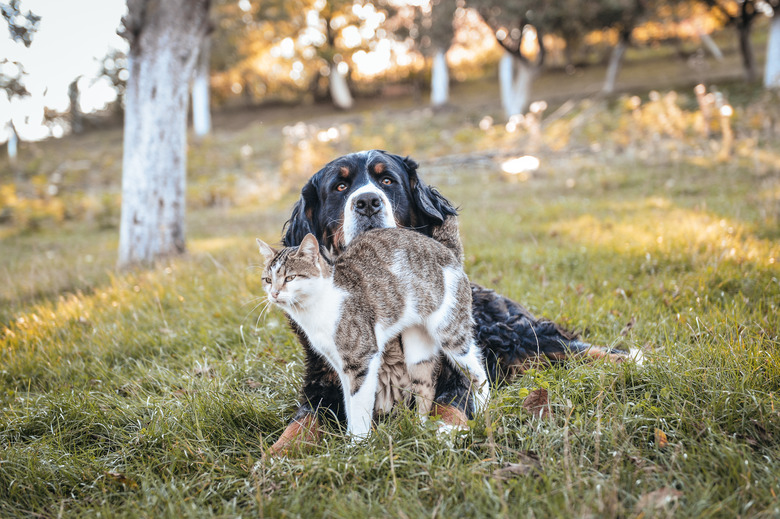Why Is My Dog Vomiting White Phlegm?
If your dog suddenly coughs up white foam or phlegm or vomits a white foamy bile, you probably have many questions racing through your head. Did they eat something bad? Did they get into the garbage? Did they swallow a foreign object? Do we need to get to a veterinarian?
Dog owners who experience this should take their dog to the veterinarian as soon as possible, and it can also help to understand the root causes of both coughing and vomiting as well as what phlegm actually is.
Is my dog vomiting or coughing?
Is my dog vomiting or coughing?
Dog coughing is distinct from vomiting. Dogs may have a dry cough, or they may cough up phlegm, a mucus secreted by the respiratory passages of the lungs. Coughing is accompanied by hacking sounds, noises in the throat, and movement of the chest and ribs.
While coughing and vomiting can look similar in your dog, vomiting is accompanied by gagging sounds (in contrast to "hacking" sounds) and stomach contractions. If your dog vomits white foam once and then appears fine, just observe them. Phlegm is a white foamy substance that typically comes from stomach acids mixed with saliva. If your dog is exhibiting either of these in amounts that are either new or different, it can mean there is a pet health issue.
Common causes of coughing in dogs
Common causes of coughing in dogs
Kennel cough is a mild sickness that dogs contract from one another. It usually goes away within seven to 10 days, but it can result in your dog hacking or coughing up white foam and clear liquid. A productive or "wet" cough, when fluid is brought up from the lungs, indicates a serious respiratory infection, like pneumonia. Other causes include heart disease and tracheal collapse.
Why is my dog vomiting?
Why is my dog vomiting?
If your dog ate food or drank water too fast, they may get an upset stomach or indigestion. Vomiting relieves that bad feeling. Like humans, dogs get acid reflux as well, and that can lead to a dog vomiting white foam.
Repeated vomiting of foamy liquid can be caused by more serious conditions, including gastritis or toxin exposure. Foaming at the mouth could indicate a foreign body or blockage in the mouth and throat. If there is any breathing difficulty, repeated vomiting, abdominal pain, lethargy, behavior change, or loss of appetite, seek veterinary care right away.
Bloat, another very serious and life-threatening condition, causes a dog's stomach to expand. In addition to your dog throwing up, they may pace and experience pain, swelling, distended abdomen, retching, panting, increased breathing rate, or excessive drooling. They may be unwilling to lie down and may appear distressed or panicked.
Pancreatitis
Pancreatitis is another disease where one of the symptoms is your dog vomiting white foam or slime. Other symptoms include weakness, diarrhea, and loss of appetite.
Parvovirus
Some puppies get parvovirus, which results in vomiting. Your puppy may also have a fever, be lethargic, and have bloody diarrhea.
Kidney disease
If your dog has kidney disease, they might cough up white foam and have trouble urinating, be lethargic, and experience disorientation.
Pet parents who notice any combination of the symptoms of these serious and possibly fatal conditions should seek emergency veterinary care right away.
Treatment for dogs vomiting white foam or coughing up white foam
Treatment for dogs vomiting white foam or coughing up white foam
If your dog is bringing up white liquid, observe them to see if they are coughing or vomiting. This information will help your veterinarian determine a cause when you bring your dog in. Coughing in dogs can be caused by a variety of respiratory issues, including infectious diseases, allergies, tracheal abnormalities and collapse, and heart and lung diseases. Your veterinarian will need to diagnose the underlying cause of the cough. After an exam and possible diagnostic tests, your veterinarian will discuss a treatment plan. This may involve antibiotics or other medications as well as a cough suppressant.
To treat your dog's vomiting, your veterinarian may recommend fluids, nausea medications, dietary changes, or antacids. In severe cases of blockage or bloat, surgery could be necessary. If they rule out these conditions, it may be recommended that you restrict your dog's food or alter their diet until they start to feel better.
Typically, you'll feed your dog simple foods, like bland chicken and rice in small quantities. Your veterinarian may also recommend putting bananas, oatmeal, and pumpkin into your dog's food to help the upset stomach.
Preventing dog coughing and vomiting
Preventing dog coughing and vomiting
Depending on your dog's lifestyle and risk, vaccinations for illnesses like kennel cough and canine influenza can protect them from these infections. Regular veterinary visits also allow your veterinarian to listen to your dog's heart and lungs, which can help detect heart disease early. It's also a good idea to avoid contact with other coughing dogs, especially if your dog is not yet vaccinated.
To prevent your dog's vomiting, you can start with diet. Ask your veterinarian for a recommendation of the best brand or type of food that is easier on their digestive system or that is best for general dog health. This might be a senior formula or one for sensitive stomachs.
If your dog is eating too fast, you can purchase a slow-feeder bowl that is designed to make wolfing down food impossible. You can also hand-feed your dog or play hide and seek with their food by placing small quantities of it around the house or yard. Reduce access to trash, human food, or swallowable items that can lead to gastrointestinal distress.
To stop your dog from drinking too fast, you can use a special bowl or put ice cubes in the bowl. Pay attention to when the dog's vomiting occurs. If your dog throws up after eating or drinking, is it from drinking too much after playing hard? If so, create structured play breaks where your dog is offered a small amount of water and rests for a few minutes so they don't feel the need to gulp down water. If out and about, it's important that they always have access to water so they don't get dehydrated, causing them to drink too much too fast.
The bottom line
The bottom line
There are many reasons your dog may cough up phlegm or vomit white foamy bile. If coughing or vomiting occurs, it's best to seek care from your DVM to determine the root cause. Taking the necessary precautions can keep your dog from coughing or vomiting and ensure they are happy and healthy.

